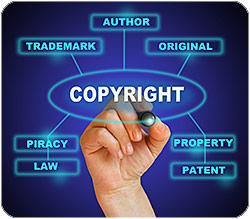FEATURE ARTICLE -
Issue 73 Articles, Issue 73: July 2015
In practice
Your client conducts an online store on eBay for motor cycle parts. The client complains to you that a competitor has also opened an online store on eBay and copied hundreds of photos your client took of motor cycle parts and also copied the corresponding descriptions of each part, which your client painstakingly wrote.
You can say to your client that, in Australia, Registrant Contact Information Policy (2010-07) [i] precludes any .au domain names from concealing their true identity. The registrant may be identified and with some corporate, business and/or ABN searches the prospective respondent responsible is found.
In some forums, Facebook and Twitter for example there is an intellectual property policy which, in obvious cases, may lead to the account being unplugged. Obviously these provide a quicker, cheaper option without the necessity for providing an undertaking as to damages. In any event, a local online operator does not present great difficulties. Yet where a client says that an online store is operating from overseas location and is infringing IP rights, some difficulty arises.
At the moment, there is little that can be done save registering rights with the Customs authorities and cease and desist letters, in the hope the offshore site operators take it seriously. However, the day has recently come, where the response to the client is going to be more than an apologetic of how expensive and time consuming it will be to sue a party in another jurisdiction, even with the assistance of the Hague Convention on service of civil process.
Introduction
There are now definite signs that the gatekeepers of online content, the internet service providers or carriage service providers (CSPs) [ii] , will be taking a major role in the challenge of online copyright infringement. Although they might not reach the lofty heights of being parties who authorise infringement by allowing sites to operate on their service with infringing content, the signs are that they will be instrumental in the enforcement of these rights.
Why is that important to me? Surely this is only an issue for the film industry or the music industry. It is true, that those interests have led the way in major intellectual property milestones such as the Australia US Free Trade Agreement 2004, however, the principle has filtered down to common commercial transactions. It is now commonplace for businesses to have an online store for their products and in some cases relinquishing a physical premises.
Position in Australia

iiNet
Looking at another milestone in the role of CSPs, the High Court considered the responsibility of internet service providers in Roadshow Films Pty Ltd v iiNet Ltd [2012] HCA 26 (iiNet). Specifically, seven of the eight judges in the iiNet appeals, considered that iiNet had acted reasonably in the circumstances. As a general observation, a common thread appearing in the reasons of their Honours, were the deficiencies in the notices provided to iiNet by the Australian Federation Against Copyright Theft (AFACT), representing the appellants (conveniently Roadshow).
Further French CJ, Crennan and Kiefel JJ found, amongst other findings, that as a matter of fact, iiNet had no direct technical power at its disposal to prevent a customer from using the BitTorrent system to download Roadshows’ films on that customer’s computer. [iii] Gummow and Hayne JJ concluded, in the context of s 101(1A), the practical course would have been to exercise the contractual power to ‘switch off and terminate further activity on suspect accounts’, however this raised the difficulty that suspension or termination denied access to non-infringing material. [iv] I think it is fair to say, that their Honours were sympathetic to the consequences facing the CSPs in the light of the information with which they had been provided.
French CJ, Crennan and Kiefel JJ determined, in the context of s 101(1A), that iiNet acted reasonably, because its inactivity was not based on indifference to infringement but rather “that iiNet was unwilling to act because of its assessment of the risks of taking steps based only on the information in the AFACT notices”. [v] Gummow and Hayne JJ concluded, again in the context of s 101(1A), that it “was not unreasonable for iiNet to take the view that it need not act upon the incomplete allegations of primary infringements in the AFACT Notices without further investigation which it should not be required itself to undertake, at its peril of committing secondary infringement.” [vi]
Similarly, Emmett J of the Full Court of the Federal Court said “it was not reasonable to require iiNet to undertake the immense amount of work, cost and effort required in order to set out, review and analyse the allegations in the information provided with the Infringement Notices”. [vii]
Discussion Paper
The Government (amongst other stakeholders I expect) did not like the iiNet decision.
On 30 July 2014, the Attorney-General, Senator the Hon George Brandis QC and the Minister for Communications the Hon Malcolm Turnbull MP, in a joint media release, announced the circulation of the Online Copyright Infringement Discussion Paper [viii] (the Paper). The Paper, sought responses to a number of questions. [ix] Relevantly, a number of the questions gravitated around the reasonable steps that an ISP could take, to prevent or avoid copyright infringement.
Of iiNet, the Paper said:
The High Court’s decision in Roadshow Films Pty Ltd & Ors v iiNet Ltd determined that iiNet was not liable for authorising the copyright infringements of its subscribers using systems that iiNet did not operate or control, and that there were no reasonable steps that could have been taken by iiNet to reduce its subscribers’ infringements. The effect of the decision is to severely limit the circumstances in which an ISP can be found liable for authorising an act by a subscriber that infringes copyright.
The Government was of the view that even where a CSP did not have a direct power to prevent a person from doing a particular infringing act, there may be reasonable steps which could be taken by the CSP to discourage or reduce online copyright infringement. [x] It was further encouraged by a UK decision of the High Court, which ordered British Telecom to block access to the infringing website Newsbin2. The Court considered that British Telecom could rely upon technology it had implemented to block access to child pornography websites, and that the cost of implementing the order would therefore be ‘modest and proportionate’. [xi] The Paper noted that the High Court in the UK continued to make orders for CSPs to block infringing websites. [xii]
 Copyright Amendment (Online Infringement) Bill 2015
Copyright Amendment (Online Infringement) Bill 2015
On 26 March 2015, the Copyright Amendment (Online Infringement) Bill 2015 (the Bill) was introduced into parliament. After the second reading on the same day, it was referred to the Senate Legal and Constitutional Affairs Legislation Committee (the Committee), which was due to report in mid-May 2015, but following an approved extension of time, provided its report on 11 June 2015 (the Report).
On 22 June 2015, both Houses of Parliament passed the Bill. The Act commences on the day after it receives the Royal Assent. The Committee recommendations made in the Report were generally adopted. A total of four (4) substantive recommendations were made in the Report at p 29. These are summarised as follows:
- Section 115A(5), in relation to the matters which the Court is to take into account, the Report recommended that the words “is to” are to be replaced by the word “may”. This recommendation was adopted in the Bill as passed.
- That in relation to the ‘reasonable steps [to be taken by the CSP], to disable access to an online location’ referred to in s 115A(2), the EM be amended to require that the reasonable steps may include a ‘requirement to post a landing page at the blocked online location, specifying that the relevant online location has been blocked by a court order and outlining details of that order’: the Report at [3.15]. This recommendation was adopted and appears in the revised Explanatory Memorandum accompanying the Bill when passed (the revised EM) at [43].
- That the government reviews the effectiveness of the Bill in 2 years after its enactment. It has been reported in certain media reports that the G overnment has said it will review the effectiveness of the laws in 18 months. Neither the Bill as passed, has made it a statutory requirement, nor is there any indication in the revised EM of such a review.
- A recommendation for the EM to be amended to provide greater clarity and guidance on the issue of service provider costs and liability, subsequent to the service provider’s compliance with court orders made under proposed section 115A. This recommendation was adopted and appears in the revised EM at [63] to [65].
Key provisions of the legislation
A new provision, s 115A is inserted into the Copyright Act 1968 (Cth), which will give an opportunity to the owner of copyright to apply to the Federal Court of Australia, for a specific type of injunction which will require the carriage service provider (CSP) to take reasonable steps to disable access to the online location. [xiii]
The Federal Court must be satisfied that:
- The CSP provides access to an online location outside of Australia.
- The online location infringes copyright; and
- The primary purpose of the online location is either to infringe copyright or facilitate the infringement. [xiv]
It may also take into account a number of things, [xv] including:
- the flagrancy of the infringement;
- whether the owner or operator of the online location demonstrates a disregard for copyright generally;
- whether disabling access to the online location is a proportionate response in the circumstances;
- the impact on any person, or class of persons, likely to be affected by the grant of the injunction.
One practical matter is taken into account in the legislation. The identity of the domain operator is not always easy to ascertain, particularly with the growing use of domain privacy services, who are identified as the registrants, but only do so as a service, thereby shielding the identity of the true operator. The Bill provided for the owner and the CSP to be parties to an application, as well as the operator of the offending site “…but only if that person makes an application to be joined as a party to the proceedings”. [xvi]
It is easy to identify the extremes. The site dealing solely in pirated movies or access to them on the one hand and examples, such as those mentioned in the Explanatory Memorandum (EM) of www.youtube.com or www.blogger.com, on the other. [xvii] The legislation does not provide a definition of ‘primary purpose’, however the Government has included in the EM the following comment:
“This is an intentionally high threshold for the copyright owner to meet as a safeguard against any potential abuse. For example, the ‘primary purpose’ test would prevent an injunction to disable access to an art gallery website operated outside of Australia that may contain an unauthorised photograph.” [xviii]
However, it is not always that easy. There will be sites which will have articles infringing your client’s copyright, articles infringing other well-known works but in addition, other items which may be infringing someone’s copyright but you have no way of knowing whether they do. One approach may be depending on the flagrancy of the copying, that the operator of the site is recklessly indifferent to whether they are infringing copyright.
High Court UK
On 26 May 2015, the High Court in the UK, granted the Publishers Association an injunction against five CSPs, BT, Virgin Media, Sky, TalkTalk and EE, ordering the CSPs to shut down access to 7 websites, which it was alleged held between them, in the vicinity of 10million ebooks, of which at least 80% were claimed to infringe copyright. The UK legislation relevantly provided:
“The High Court …shall have power to grant an injunction against a service provider, where that service provider has actual knowledge of another person using their service to infringe copyright.” [xix]
The UK legislation further provided that in determining whether the CSP had the requisite knowledge, a court shall have regard to whether a regulated notice to the CSP under a specific EC directive was issued. [xx]
Conclusion
What this means for the online world, is that there is now a clear two pronged attack closing in on online infringement. The first is against the individual. The Federal Court has recently shown that it can and will make orders for preliminary discovery by the CSP of the identity the 4,726 individuals behind the 4,726 identified IP addresses. [xxi]
The second, is not so much against the CSPs as an authoriser of infringing conduct, as was the case in iiNet, but rather using the unique position of the CSP to shut down the source of the infringement. Where this differs from iiNet and in principle, the attempt by Louis Vuitton to make the owners/operators of a market accessorily liable for the infringements of stall-holders within the market, [xxii] is that the new Bill does not appear to require any knowledge on the part of the CSP as a perquisite to relief. The pre-requisites are limited to notice to the CSP and the online operator, of an intended application for the injunction. [xxiii]
Although this legislation relates to copyright, it is foreseeable that it could extend to other forms of IP such as trade marks, in a similar way as additional damages filtered through to the other IP forms commencing with copyright. One thing is certain, in cases where the whole site is not riddled with copyright infringing material, it would be a brave adviser that would recommend to a client to give the anticipated undertaking as to damages, which will almost certainly be required before the Court’s discretion is exercised in favour of granting the relief.
Dimitrios Eliades
Footnotes
[i] Section 2.4.
[ii] The Copyright Amendment (Online Infringement) Bill 2015 referred to carriage service providers. The High Court decision in Roadshow Films Pty Ltd v iiNet Ltd [2012] HCA 26 refers to these providers as internet service providers. In this paper the terminology of the new legislation CSPs, is adopted.
[iii] iiNet at [65].
[iv] iiNet at [139].
[v] iiNet at [76].
[vi] iiNet at [146].
[vii] Roadshow Films Pty Limited v iiNet Limited [2011] FCAFC 23 at [205].
[viii] Online Copyright Infringement Discussion Paper at page 3.
[ix] http://www.ag.gov.au/consultations/pages/onlinecopyrightinfringementpublicconsultation.aspx
[x] The Paper at page 3.
[xi] Twentieth Century Fox Film Corporation & Ors v British Telecommunications plc [2011] EWHC 2714 (Ch) (British Telecom).
[xii] The Paper at page 5.
[xiii] Proposed s 115A(1) and (2).
[xiv] Proposed s 115A(1).
[xv] Proposed s 115A(5).
[xvi] Proposed s 115A(3).
[xvii] The EM at [38].
[xviii] Ibid.
[xix] Copyright, Designs and Patents Act 1988 (UK) s 97A(1).
[xx] Copyright, Designs and Patents Act 1988 (UK) s 97A(2).
[xxi] Dallas Buyers Club LLC v iiNet Limited [2015] FCA 317 (Perram J, 7 April 2015).
[xxii] Louis Vuitton Malletier SA v Toea Pty Ltd [2006] FCA 1443.
[xxiii] Proposed s 115A(4) provides that the notice to the online operator may be waived by the Court in certain circumstances





 Copyright Amendment (Online Infringement) Bill 2015
Copyright Amendment (Online Infringement) Bill 2015